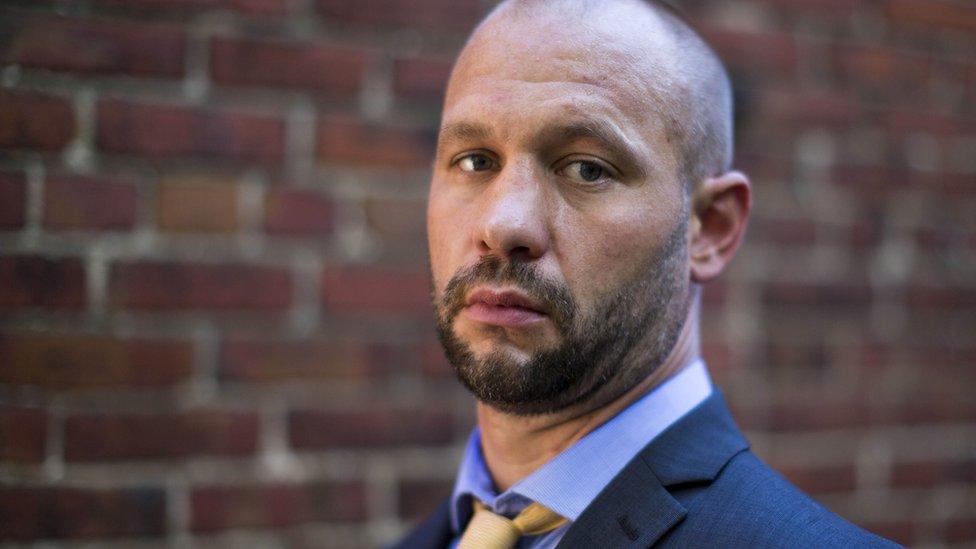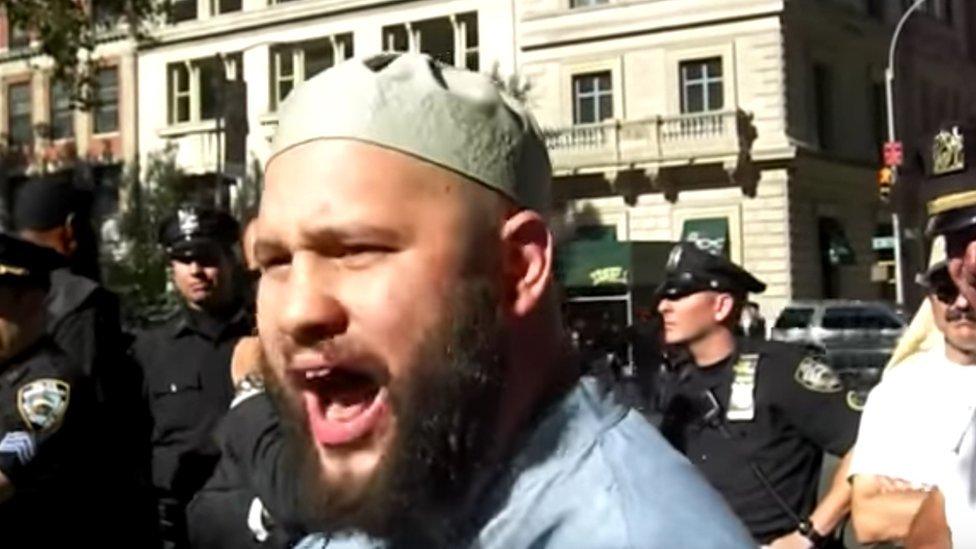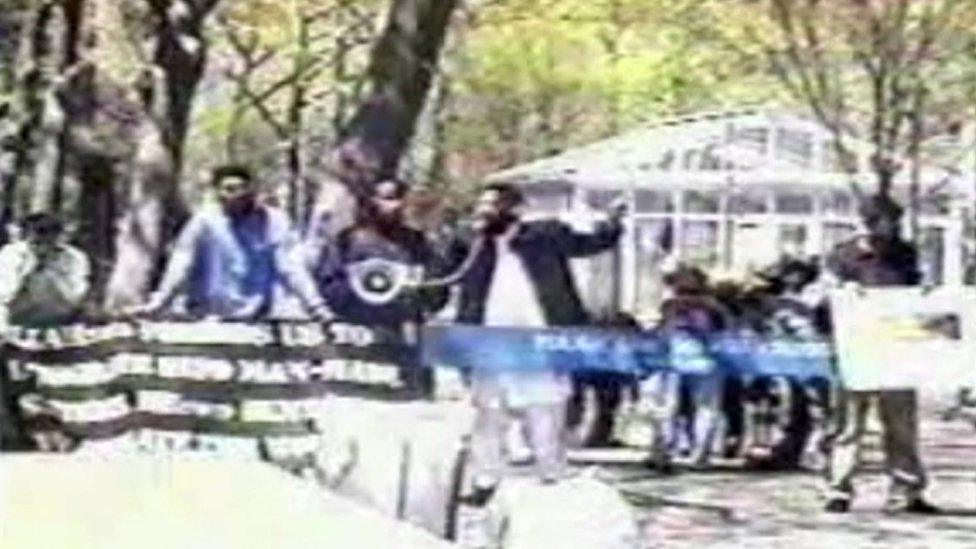Anjem Choudary's American follower
- Published

Jesse Morton today
Anjem Choudary has been jailed for five-and-a-half years in the UK for inviting others to support the Islamic State militant group, but his influence stretched all the way to the US.
If Jesse Morton had not, as he puts it, "opened his mind", he would be among the most dangerous men within walking distance of the White House.
Instead, as the most powerful man in the Western world sits in the Oval Office, Morton now sits in his university office, just six blocks away, and ponders how he once aspired to raise the black flag of al-Qaeda where the Stars and Stripes flutter.
Jesse Morton, 37, is a newly recruited academic researching extremism at George Washington University, external.
Four years ago, the New Yorker, then known as Younus Abdullah Muhammed, was jailed for more than 11 years for, among other things, encouraging extremists to attack the creators of the South Park cartoon. The satire had depicted the prophet Muhammad - albeit hidden in a comedy bear suit - much to the fury of men such as Morton.
But today he is out, deradicalised and regretting the way he encouraged jihadism, as he told BBC Radio Four's The Briefing Room programme.
Morton's sentence was cut after he proved that he had changed and provided intelligence on the activities of his network to the FBI and, later, Britain's intelligence and security agencies.
He isn't letting on exactly what he passed on - but an awful lot of what he had to say to the Brits was about his experiences of Anjem Choudary, who on Tuesday learnt his sentence for inviting his acolytes to support the banned self-styled Islamic State group.

Jesse Morton as Younus, protesting in New York
So how did a man in New York become part of Choudary's network?
Morton had suffered abuse as a child and after being imprisoned for drugs offences he was full of anger.
"My childhood set me up for rejection of American society and the Western view," he says. "I was searching for an identity, a counter-cultural identity."
He left jail believing in an extreme version of Islam, radicalised by a fellow prisoner. In 2004, during New York's annual Muslim Day Parade, he walked into the world of Choudary's American followers.
"I was eating at a food stand and I saw them - the Islamic Thinkers Society - with their black flag and T-shirts saying in Arabic 'I Love Jihad'.
"Wow, I'm attracted. There are pictures of dead Muslim children [in conflicts around the world]. There are leaflets on the Khilafah [Islamic State], denunciations of George W Bush and his crusade.
"I was hooked. And I went up to the man at the back who looked like the leader and said, 'I want to join your movement'."
The Islamic Thinkers Society was the American branch of the al-Muhajiroun movement launched in the UK by Choudary's mentor, the Syrian preacher Omar Bakri Mohammed.
Just like its British counterpart, its activities were focused on calling for an Islamic state for the whole world - the core of Bakri's ideology.
It was largely left to its own devices - Bakri and Choudary's strategy was to set up franchises where they could, provide the materials, and let the locals get on with it.
However, footage discovered by BBC News, buried on YouTube, apparently shows Choudary in New York, external before 9/11.

Anjem Choudary, centre, leading a chant in support of Bin Laden, 2000, New York City
The clip shows him leading a chant in support of Osama bin Laden and calling for "jihad" - something he never said or did in the UK. The claimed location of the footage, close to the UN building, can be matched to maps of New York.
By 2004, Choudary wasn't going to risk travelling to the US - things were getting hot for him and Bakri, who was soon to flee the UK.
But they were giving the IST all the help they could - and Morton became immersed in the online cult-like study circles organised from London.
"I had been looking for this very organisation," says Morton now. "I already had the belief that my society had betrayed me. I was already sympathising with al-Qaeda. My religious conversion was much more of a political statement than theological and this group was giving me an outlet."
While they were living thousands of miles apart, Choudary and Morton met online thanks to Skype - and Choudary encouraged the group to promote the recruit because of his public speaking abilities.
But in time, Morton began to doubt whether Choudary was genuinely committed to anything beyond his own self-promotion - and he ultimately started down his own path, with his own extremist website, that would lead to his conviction.
Did he ever see or hear Choudary advocate violence? It was all, he says, done on a nod and a wink.
"In private, when we were online, he was very similar to what you would hear in public," he says. "But he would give a very detailed run down on the arguments, the 'permissibility' of violence from a theological perspective.
"He would talk about how there were texts that would set out the obligation of Muslims to defend Muslim lands. And they'd drop into your inbox."
That is the way Choudary operated - planting the idea and leaving it to his followers to work out what it meant.
There is one encounter that Morton recalls that has always left him wondering about his and Choudary's personal responsibility.
Eager to grow his global brand, Choudary had assigned four of his followers in the UK to help populate Morton's website with the British group's teachings.
One day, after Morton had given an online talk about the evils of the financial institutions in the City of London, one of the four contacted him to ask whether it was Islamically permissible to attack them.
"They did not ask me about specifics and I referred them back to Anjem - he was their Emir [leader] after all."
"Some time later they contacted me and said they would not be taking part for some time in the movement. It was later - after my own arrest - that I discovered they had been arrested [and later jailed] for a plan to bomb the London Stock Exchange."